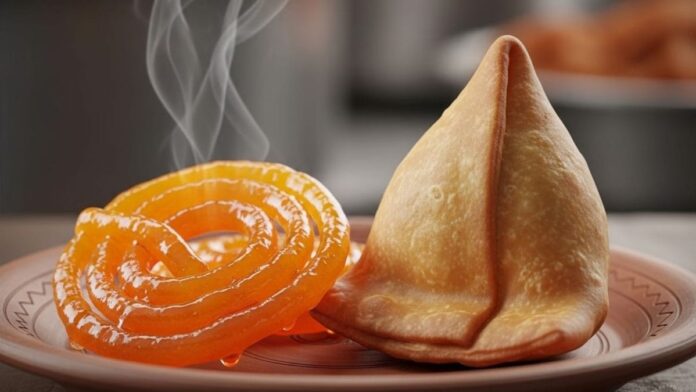Last Updated:
Obesity and lifestyle diseases are creeping in at younger ages, fuelled by exactly the kind of diet that puts samosa and jalebi at the centre
Samosas and jalebis are being flagged as part of a public health threat
If jalebis and samosas are your go-to evening snack, health experts now want you to pause and think again. What used to be comfort food has been thrust into the spotlight for all the wrong reasons, and the comparisons being drawn are as sharp as they are surprising. Samosa and jalebi are today’s cigarettes, warn nutritionists and public health officials alike.
The phrase may sound dramatic, but here’s what’s backing it up.
According to dietitian Mukta Vashisht, both jalebi and samosa are “calorie bombs”. A single 100-gram serving of jalebi packs around 356 calories, made up almost entirely of refined flour, sugar, and oil. The sweetness might feel comforting, she says, but it wreaks havoc on blood sugar levels and can lead to rapid weight gain.
Samosas, despite their savory appeal, aren’t any better. In fact, they may be slightly worse. That same 100-gram portion contains about 362 calories, filled with deep-fried oil, spiced potatoes, and maida. Not only does this spike carbohydrate and fat intake, but repeated frying, often with reheated oil, introduces trans fats that increase the risk of heart disease.
Here’s the bigger issue: both of these snacks, consumed regularly, are strongly linked to a higher risk of diabetes, obesity, high cholesterol, and cardiovascular disease. And now, their impact is being taken seriously at the policy level, especially when it comes to children.
Government Cracks Down On Childhood Obesity
News18 has accessed an advisory from the Ministry of Women and Child Development, which raises serious concerns about the early signs of lifestyle diseases in children. As per fresh data from the government’s Poshan Tracker (May 2025), 6% of children under five enrolled in Anganwadi centres are already overweight or obese. That’s a red flag.
In response, the ministry has asked all states and Union Territories to take urgent steps to reshape food and lifestyle habits in young children. The advisory emphasises cutting down on visible fat (not more than 27–30 grams of oil per day), limiting saturated fat to under 10% of total energy intake, and most importantly, completely avoiding trans fats, which are found in vanaspati, margarine, bakery goods, and street snacks like samosas.
The advisory goes further, warning against reheated oil, which many vendors use repeatedly. This practice creates harmful oxidative compounds that raise the risk of cardiovascular diseases and cancer. Instead, the ministry recommends filtering used oil for limited reuse in curries only, not for frying again.
Street Food Culture Under Scrutiny
What this really means is that everyday snacks like samosas and jalebis are no longer just an indulgence. They’re being flagged as part of a larger public health threat. Viral posts and videos on social media have already started calling them the “new age cigarettes”, highlighting how these foods silently damage the body when eaten regularly.
And that message is starting to stick.
The government has now called for “Oil and Sugar” awareness boards at Anganwadi centres and public institutions, pushing visual reminders of how much is too much. Health messages around hidden fats and sugars are also being integrated into official stationery and public communication material. Even frontline workers are being nudged to model better behaviour, choosing fruit-based snacks and moving around more during the workday.
This push is part of Prime Minister Narendra Modi’s vision of a “fitter and healthier India”, and the strategy is to shift focus from fried and sugary foods toward boiled chana, fruits, and low-oil homemade snacks.
India’s love for its street food is deep-rooted. But the data is now impossible to ignore. Obesity and lifestyle diseases are creeping in at younger ages, fuelled by exactly the kind of diet that puts samosa and jalebi at the centre.
So no, no one’s saying you can’t enjoy them ever again. But what experts and policymakers are urging is restraint. Eat them occasionally, not daily. Don’t reuse oil. Avoid hidden sugars and fats in everyday meals. And above all, rethink what we normalise as “harmless” treats.
view comments
- First Published:
